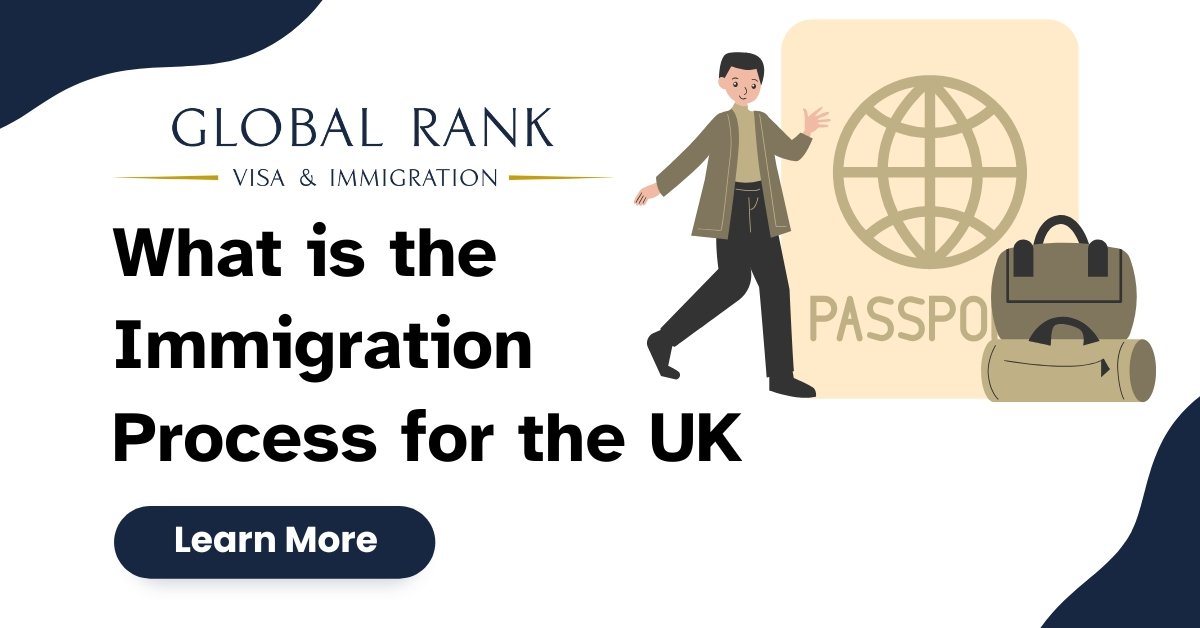What is the Immigration Process for the UK: Everything You Need to Know to Get Started

- Admin
- PNP
- OCT 28, 2024
The UK has long been a sought-after destination for immigrants, offering a wealth of opportunities for skilled workers, students, and families. Whether you’re looking to work, study, or join family members in the UK, understanding the immigration process is crucial. Navigating the UK immigration process involves multiple steps, including completing application forms, providing the required documents, and waiting for a decision from the Home Office. This guide outlines the essential steps to apply for UK immigration, the required documents, and common types of UK visas, helping you smoothly transition into your new life in the UK.
If you need expert assistance with your immigration journey, book a free consultation with us for personalized guidance.
Steps to Apply for UK Immigration
The process to apply for UK immigration varies depending on the type of visa you’re applying for. However, the general framework remains similar across most visa types. Here is a step-by-step guide to the UK immigration process:
1. Choose the Correct Visa Type
Before starting the application, you must select the right visa based on your situation, whether you’re moving to the UK for work, study, or family purposes. The UK government offers a wide range of visas, including:
- Work visas (e.g., UK Expansion Worker Visa, UK Self Sponsor Visa)
- Family visas (e.g., UK Spouse Visa)
- Study visas (e.g., Tier 4 student visas)
- Business visas (e.g., UK Innovator Founder Visa)
Researching the right visa type for your needs is the first critical step in the process.
2. Complete the Application Form
Once you’ve determined the appropriate visa, you will need to fill out the visa application form online. Be sure to provide accurate information as discrepancies can delay the process or lead to rejections. Depending on the visa, you may also be required to submit a UK immigration ID check via an app or in person.
3. Submit Required Documents
After completing the application, you must submit all the necessary documents. This includes proof of identity, financial statements, and your reason for immigrating (e.g., job offer or family ties). We will cover the required documents in detail below.
4. Attend a Biometric Appointment
Most visa applicants are required to provide biometric information, including fingerprints and a photograph. This can be done at a visa application center in your home country. In some cases, you can use the immigration ID check app to complete this step remotely.
5. Pay the Application Fees
Immigration to the UK comes with associated fees that vary depending on the visa type. Some applicants opt for the super-priority service to receive a decision faster, but this comes with an additional fee.
6. Wait for a Decision
Once you’ve submitted your application and biometrics, you will wait for the Home Office to process your visa. The timeline varies based on the visa type and the service level selected. During this period, you can track your application status online.
7. Collect Your Visa and Travel to the UK
When applying for a UK visa, the documents you submit are critical to the success of your application. Missing or incorrect documents can result in delays or rejection. Here’s a list of the most commonly required documents for UK visa applications:
Required Documents for UK Visa Applications
When applying for a UK visa, the documents you submit are critical to the success of your application. Missing or incorrect documents can result in delays or rejection. Here’s a list of the most commonly required documents for UK visa applications:
Basic Documents Needed for All Visa Types:
- Valid Passport: Your passport must be valid for at least six months from the date of your application.
- Proof of Financial Stability: Bank statements showing that you have enough money to support yourself during your stay.
- Passport-Sized Photos: Recent photos that meet UK visa photo requirements.
- Visa Application Form: Complete and sign the visa application form specific to the visa type.
- Proof of English Proficiency: For certain visas, you may need to prove your English language ability through tests like IELTS.
- Criminal Record Certificate: For specific work visas, proof that you have no criminal record may be required.
TB Test Results: Applicants from certain countries must provide tuberculosis test results.
Additional Documents Based on Visa Type:
- Work Visa: Job offer letter, employment contract, and certificate of sponsorship.
- Student Visa: Confirmation of Acceptance for Studies (CAS) from a recognized UK institution.
- Family Visa: Marriage certificate or birth certificate to prove family relationships.
It’s essential to ensure that all documents are translated into English (if applicable) and are valid at the time of submission.
Common Types of UK Visas Explained
The UK offers various visa types depending on your purpose for immigrating, whether for work, study, or family reunification. Below, we’ll explain the most common types of UK visas:
1. Work Visas:
- Skilled Worker Visa: For those with a confirmed job offer from a UK employer, particularly in shortage occupation fields.
- UK Expansion Worker Visa: For employees of international businesses looking to establish a UK branch.
- UK Innovator Founder Visa: For entrepreneurs planning to start an innovative business in the UK.
- UK Self Sponsor Visa: Allows you to sponsor yourself for UK work if you’re setting up a business.
2. Family Visas:
- UK Spouse Visa: For those looking to join their spouse or partner who is a UK resident.
3. Study Visa:
- Tier 4 Student Visa: For students attending an accredited UK institution. This visa allows you to study and work part-time while enrolled in your course.
4. Visitor Visa:
- Standard Visitor Visa: For tourists, business visitors, and short-term study visits. This visa allows you to stay in the UK for up to six months.
Timeline for UK Immigration Processing
Understanding the processing time for your UK visa is important for planning your move. Processing times can vary based on the visa type, your location, and whether you’ve chosen standard or expedited service.
Standard Processing Times:
- Visitor Visa: Usually processed within 3 weeks.
- Work Visas: Skilled worker visas typically take between 8-12 weeks to process.
- Family Visas: Processing can take 12 weeks or longer, depending on the complexity of the case.
- Student Visa: Typically takes 3-4 weeks to process.
Factors Affecting Processing Time:
- Super Priority Service: For an additional fee, this service ensures you receive a decision within 24 hours.
- Biometric Delays: If your biometric appointment is delayed, this can affect your overall processing time.
- Holiday Periods: UK public holidays can slow down processing times at the Home Office.
If you need a faster decision for urgent travel plans, the super-priority service may be an option worth considering. For personalized guidance on expediting your application, book a free consultation with us today.
FAQs
The processing time for UK visas varies depending on the visa type. For example, visitor visas typically take around 3 weeks, while skilled worker visas may take 8-12 weeks. Expedited services such as the super priority service can provide a decision within 24 hours.
If your visa application is refused, the Home Office will provide a reason for the refusal. You may have the option to appeal the decision or reapply with the correct information and documents. Consulting with an immigration expert can improve your chances of approval if you’re facing a visa refusal.
Yes, many UK visas allow you to bring family members, including your spouse, children, and dependents. For instance, the UK Skilled Worker Visa and UK Spouse Visa allow you to include your family members in your application. You will need to prove your relationship and show that you can financially support them during their stay.
To apply for a UK work visa, you will generally need a valid passport, job offer letter, bank statements, a criminal record certificate (for some visas), and proof of English proficiency. The specific documents required depend on the type of visa you are applying for.
In some cases, you can switch from one visa category to another while in the UK, such as from a student visa to a work visa. However, not all visa categories allow this. It’s essential to check the eligibility criteria for switching visas before making any changes.
The UK immigration ID check app allows certain visa applicants to submit their biometric information and prove their identity remotely without needing to visit a visa application center. This streamlines the process for applicants already in the UK or certain eligible visa categories.
Additional Information
In the following sections, more information and current data concerning the PNP can be found on the official websites of certain provincial programs or a designated immigration lawyer.
Are you set to go? Get in touch with us now to know how we can help you with your Provincial Nominee Program and your future in Canada.
With the help of this detailed plan, you will be ready to start your Canadian immigration process through the PNP.
